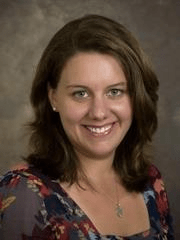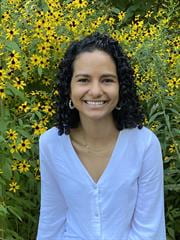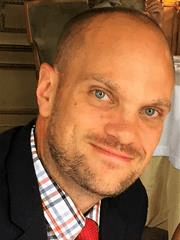Zachary Meehan is a graduate student in the University of Delaware’s Clinical Psychology Doctoral Program. As a research assistant, Zachary splits his time between various C-TECC projects.
Category: Undergraduate Research Assistant
People:undergraduateresearchassistant
-
Ashley Thomas
Ashley Thomas is the current research coordinator for Project Core. She earned her M.Ed. from Temple University and B.A. from the University of Delaware.
-
Sydney Burlew

Sydney Burlew is a junior who majors in Psychology and Criminal Justice with a minor in Legal Studies. Sydney joined CTECC Spring 2018.
-
Danielle Hess

Danielle Hess is a sophomore who majors in Human Services with a concentration in Clinical Services with a minor in Disability Studies . Danielle joined CTECC Spring 2018.
-
BRIANA HAUT

Associate Scientist
University of Delaware
301 McKinly Lab
Newark, DE 19716302-831-8925
Associated Research Projects
PROJECT CORE
Project CORE is a collaborative effort with the State of Delaware to identify and treat individuals in the community ages 16-25 who are at risk for developing later psychosis.
PROJECT TAP
Project TAP is focused on understanding the experience of community clinicians and mental health administrators who have recently adopted an Evidence-Based Psychotherapy (EBP) model. Quantitative and qualitative data will be used to inform future efforts to implement EBPs in community settings.
-
FRANSSY ZABLAH

Post-Doctoral Fellow
University of Delaware
Newark, DE 19716Biography
Franssy M. Zablah, Ph.D. splits her time between the Center for Training, Evaluation, and Community Collaboration (C-TECC) and the Attachment and Biobehavioral Catch-up lab. At C-TECC, she is leading the evaluation of a System of Care expansion within the State of Delaware’s Division of Prevention and Behavioral Health Services and leading the piloting and Spanish-adaptation of a parenting and financial well-being intervention for low-income families. In the ABC lab, she provides clinical supervision and supports training of bilingual parent coaches who implement the intervention. Additionally, Dr. Zablah supervises first- and second-year doctoral students in clinical psychology who are completing their clinical practicum in the Psychological Services Training Center (PSTC) at the University of Delaware.
Dr. Zablah’s research interests are guided by a prevention science framework. Specifically, she is interested in conducting research aimed at improving access and quality of evidence-based services in community settings for underserved, racially diverse families. Dr. Zablah is originally from Honduras and she is passionate about the promotion of culturally and linguistically relevant care for the Latino community.
-
TIMOTHY FOWLES

Assistant Professor
Director, Psychological Services Training Center
Associate Director, Center for Training, Evaluation, and Community Collaboration (C-TECC)
University of Delaware
800 Barksdale Road
Newark, DE 19716
302-831-6308Background and Interests
Dr. Fowles’ work centers on bridging the science-to-service gap through translational clinical science and the dissemination and implementation (D&I) of Evidence-Based Practices (EBP). As Director of the Psychological Services Training Center (PSTC), he trains students as clinicians, supervisors, and system-designers. This work coincides with Dr. Fowles role in establishing the Delaware Project and its vision for training the next generation of clinical scientists (see www.delawareproject.org). This vision is realized at the PSTC in a variety of ways including 1) the implementation of a specialty practica in EBP, 2) the investigation and piloting of EBPs in preparation for community implementation, 3) innovative problem-based learning like HealthCare Theatre, and 4) the building of interdisciplinary relationships with partners within the University (e.g., Nurse-Managed Healthcare, Employee Assistance) as well as outside the University (e.g., Delaware Psychological Association, Division of Prevention and Behavioral Health Services, Delaware Mental Health Association). Dr. Fowles also serves as Associate Director of the Center for Training, Evaluation, and Community Collaboration (C-TECC). Dr. Fowles co-founded C-TECC to create a vehicle to maximize community training, partnerships, problem-solving around dissemination and implementation, and planning for sustainability. In these complimentary roles, Dr. Fowles works on improving science-based clinical services and service networks at every level.
Degrees
Ph.D., University of Utah
Courses Regularly Taught
PSYC380: Psychopathology
PSYC334: Abnormal Psychology
PSYC809: Research Design
PSYC839: Professional Issues: Ethics, Diversity, Supervision, & Consultation
-
RYAN BEVERIDGE

Associate Professor
Director, Center for Training, Evaluation, and Community Collaboration (C-TECC)
University of Delaware
800 Barksdale Road
Newark, DE 19716302-831-7346
Background and Interests
Dr. Beveridge is interested in developing, implementing, and evaluating academic and community mental health partnerships that facilitate the effective dissemination and implementation of science-based mental health care. His past work utilized a social-contextual approach to explore how collaborative relationships and cognitive appraisals relate to successful problem-solving and learning in married couples and parent-child dyads. This research has informed his current work that emphasizes a transactional flow of information in which scientists, community administrators, community clinicians, and family members work together to successfully implement EBPs in community settings. His collaborative approach to dissemination and implementation of science in the community is consistent with a knowledge utilization framework that capitalizes on unique expertise from community stakeholders that informs laboratory treatment development and treatment implementation. This method contrasts a unidirectional top-down model of dissemination that does not maximize the value of community, clinical, and laboratory collaborations that can produce more potent, implementable treatments for society.
Dr. Beveridge is working with national clinical science leaders to develop training models for students that emphasize continuity among the broad spectrum of intervention research and clinical activities in the community. Specifically, he is a member of the Delaware Project leadership committee, a project that he co-chaired, focused on the integration of community clinical training with traditional laboratory research (www.delawareproject.org).
Additionally, he is the co-founder and Director of the University of Delaware’s Center for Training, Evaluation, and Community Collaboration (C-TECC ).This Center allows graduate and undergraduate students to collaborate with community partners on several large dissemination and implementation efforts within the State of Delaware. Students are trained to plan, train and implement, and evaluate the effectiveness, uptake, sustainability, and community satisfaction of Parent Child Interaction Therapy (PCIT), Attachment and Biobehavioral Catch-up (ABC), Portland Identification and Early Referral (PIER), and the Global Appraisal of Individual Needs (GAIN), in community settings.
Degrees
Ph.D., University of Utah
Courses Regularly Taught
PSYC365: Field Placement
PSYC432: Health Psychology
PSYC821: Individual Intelligence and Achievement Testing
PSYC867: Clinical Supervision
Recent Publications
Beveridge, R.M., Fowles, T.R., Masse, J.J., Parrish, B.P., Smith, M.S., Circo, G., Widdoes, N.S. (2015). The dissemination and implementation of Parent-Child Interaction Therapy (PCIT): Lessons learned from a state-wide system of care. Children and Youth Services Review, 48, 38-48.
Shoham, V., Rohrbaugh, M.J., Onken, L.S., Cuthbert, B.N., Beveridge, R.M., & Fowles, T.R. (2014). Redefining clinical science training: Purpose and products of the Delaware Project. Clinical Psychological Science, 2, (1), 8-21.
Beveridge, R.M. & Graber, E.C. (2013). Family Relationships. In Encyclopedia of Behavioral Medicine. (Vol. 2, pp. 780-782). New York, NY: Springer
Graber, E.C. & Beveridge, R.M. (2013). Family Social Support. In Encyclopedia of Behavioral Medicine. (Vol. 2, pp. 769-771). New York, NY: Springer.
Berg, C. A., Schindler, I., Smith, T. W., Skinner, M., & Beveridge, R. M. (2011). Perceptions of the cognitive compensation and interpersonal enjoyment functions of collaboration among middle-aged and older married couples. Psychology and Aging, 26 (1), 167-173.
Smith, T.W., Uchino, B.N., Florsheim, P., Berg, C. A., Butner, J.A., Hawkins, M., Henry, N.J., Beveridge, R.M., Pearce, G., Hopkins, P.N., Yoon, H. (2011). Affiliation and control during marital disagreement, history of divorce and asymptomatic coronary artery calcification in older couples. Psychosomatic Medicine, 73(4), 350-357.
Smith, T. W., Berg, C. A., Florsheim, P., Uchino, B. N., Pearce, G., Hawkins, M., Henry, N. J. Beveridge, R.M., Skinner, M., & Olsen-Cerny, C. (2009). Conflict and collaboration in middle-aged and older married couples: I: Effects on self-reported affect, spouse appraisals, and observed behavior. Psychology and Aging, 24 (2), 259-273.
Smith, T. W., Uchino, B. N., Berg, C., Florsheim, P., Pearce, G., Hawkins, M., Henry, N., M., Beveridge, R.M., Skinner, Ko, K. J., & Olsen-Cerny, C. (2009). Conflict and collaboration in middle-aged and older married couples: II; Age, sex, and task context moderate cardiovascular reactivity during marital interaction. Psychology and Aging, 24 (2), 274-286.
Smith, T. W., Uchino, B. N., Berg, C. A., Florsheim, P., Pearce, G., Hawkins, M., Henry,N., Beveridge, R.M, Skinner, M., Hopkins, P. N., & Yoon, H. (2008). Associations of self- reports versus spouse ratings of negative affectivity, dominance, and affiliation with coronary artery disease: Where should we look and who should we ask when studying personality and health. Health Psychology, 27 (6), 676-684.
Story, N., Berg, C.A., Smith, T.W., Beveridge. R.M., Henry, N.J., & Pearce, G., (2007). Age, marital satisfaction, and optimism as predictors of positive sentiment override in middle-aged and older married couples. Psychology and Aging, 22, (4), 719-727.
Berg, C.A., Smith, T.W., Ko, K., Story, N., Beveridge, R.M., Allen, N., Florsheim, P., Pearce, G., Uchino, B., Skinner, M., & Glazer, K. (2007). Task control and cognitive abilities of self and spouse in collaboration in middle-aged and older couples. Psychology and Aging, 22 (3), 420-427.
Berg, C.A., Wiebe, D.J., Beveridge, R.M., Palmer, D.L., Korbel, C.D., & Upchurch, R. (2007). Mother-child appraised involvement in coping with diabetes stressors and emotional adjustment. Journal of Pediatric Psychology, 32 (8), 995-1005.
Beveridge, R.M., & Berg, C.A. (2007). Parent-adolescent collaboration: An interpersonal model for understanding optimal interactions. Clinical Child and Family Psychology Review 10, (1), 25-52.
Beveridge, R. M., Berg, C.A., Wiebe, D.J., & Palmer, D. L. (2006). Mother and adolescent representations of illness ownership and stressful events surrounding diabetes. Journal of Pediatric Psychology, 31 (8), 818-827.
Wiebe, D.J., Berg, C.A., Korbel, C.D., Palmer, D.L., Beveridge, R.M., Upchurch, R.,Lindsay, R., Swinyard, M.T., & Donaldson, D.L. (2005). Children’s appraisals of maternal involvement in coping with diabetes: Enhancing our understanding of adherence, metabolic control, and qualityof life across adolescence. Journal of Pediatric Psychology, 30 (2), 167-178.
Palmer, D.L., Berg, C.A., Wiebe, D.J., Beveridge, R.M., Korbel, C.D., & Upchurch, R. (2004). The role of autonomy and pubertal statues in understanding age differences in maternal involvement in diabetes responsibility across adolescence. Journal of Pediatric Psychology, 29 (1), 35-46.
